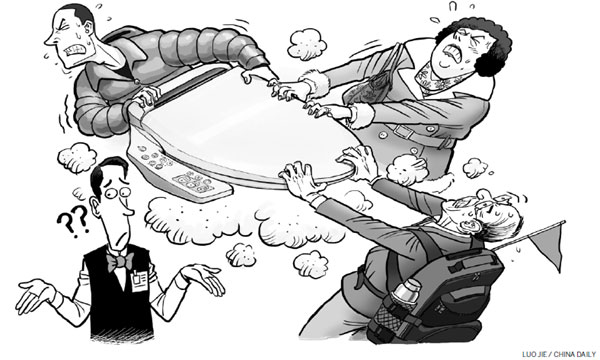
Many Chinese people are visiting Japan not only to get a firsthand experience of the country but also to buy small yet high-end electronic and electrical goods, such as rice cookers, and even toilet seats. Some reports say many Japanese duty free shops are running out of products that even cost as much as 10,000 yuan ($1,601).
The new purchase trend among Chinese, many observers believe, is a natural outcome of the falling yen, expansion of duty free shops and Japan's sagging economy. Some overseas media outlets have even exaggerated the cause, calling it "backdoor diplomacy" that could ease tensions between China and Japan.
One of the most notable effects of Japanese Prime Minister Shinzo Abe's economic policy, known as "Abenomics", is the devaluation of the yen. Blame the loose monetary policy for it, if you want to. Add to that Japan's favorable duty free policy for foreign tourists and promotion of the country's tourist attractions and you have a successful recipe for increasing retail sales. Little wonder then that an increasing number of Chinese are choosing to visit Japan.
For most of Chinese tourists, Abenomics does not - and need not - make much sense, for they are interested only in buying decent Japanese products at relatively low prices. And why not? They believe their qualities and functions far outweigh their prices. Surprisingly, though, Chinese tourists to Japan are said to be making a beeline for even rice cookers that cost about 10,000 yuan.
The craze for Japanese products, to certain extent, does reflect the noticeable difference between products "made in China" and those "made in Japan". And even though the difference may be narrowing at a healthy speed, Chinese manufacturers still have a lot to learn from their Japanese counterparts in terms of advanced technologies, exquisite workmanship and user-friendly functions in consumer products.
Still, this does not fully explain Chinese tourists' craze for shopping for gadgets, appliances and other products abroad. Despite being an important part of overseas travel, shopping makes sense if a person buys commodities that are not or rarely available in his/her own country. But there is hardly any consumer product that is available in Japan today but cannot be found in China.
The increasing number of overseas visits by and the shopping spree of Chinese nationals have been playing a vital role in building mutual understanding between the peoples of China and other countries. In 2014 alone, more than 100 million Chinese traveled abroad. This expanding scale of people-to-people exchanges have the potential to economically and culturally contribute to China's diplomacy.
Moreover, shopping for goods in foreign countries one visits is better than buying them at home, because being imported after paying high tariffs the same products cost much more in China. Therefore, Chinese tourists who are obsessed with Japanese electronic and electrical goods and buy them during their visit to that country cannot be faulted either on political or economic grounds. At best, the craze to buy Japanese products can be said to be a trend, rather than irrational consumption.
The author is deputy secretary general, Beijing Tourism Academy.

I’ve lived in China for quite a considerable time including my graduate school years, travelled and worked in a few cities and still choose my destination taking into consideration the density of smog or PM2.5 particulate matter in the region.